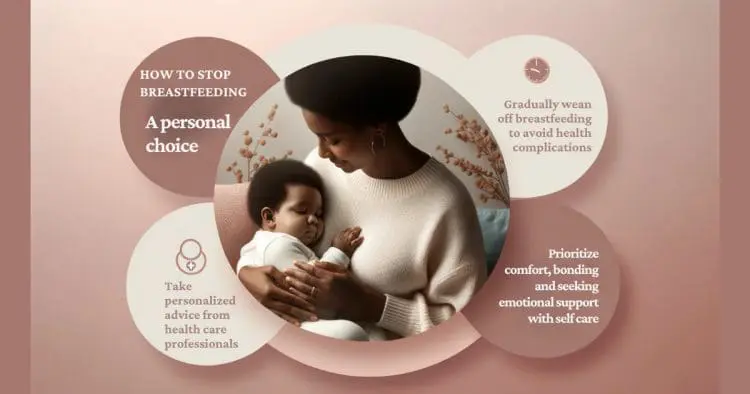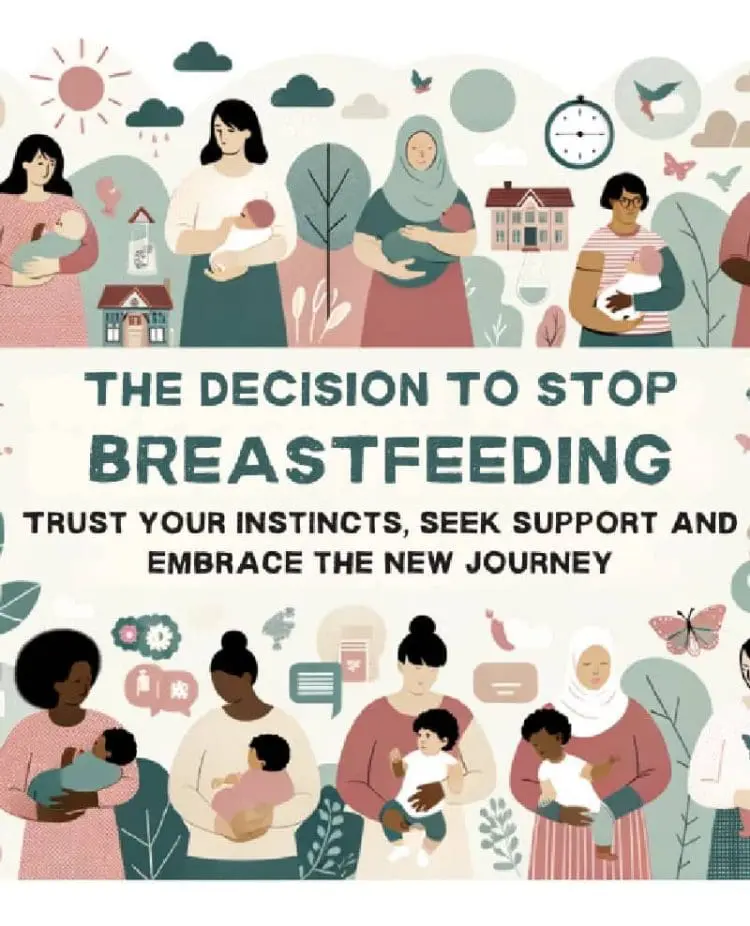Thinking about how to stop breastfeeding? Whether it’s a nudge from your intuition, a shift in your lifestyle, or simply feeling that your exclusively breastfeeding chapter is wrapping up, you’re on the brink of a new adventure. That is why I am happy to have an expert share some great tips with you today. Katie McCann, founder of “From Bump To Bubble,” offers a wealth of resources for parents transitioning from pregnancy to parenthood. With a BSc in Psychology, breastfeeding counselor certification, and experience as a former HCPC paramedic, Katie combines scientific insight with real-life parenting wisdom. Today, she shares some great breastfeeding guidance.
Embracing this change isn’t just about food—it’s about growth, bonding, and the ever-evolving journey of parenthood. As you navigate this transition, remember: every path is unique, and there’s no one-size-fits-all. So, trust your instincts, lean on support, and enjoy the journey ahead!
Read on to learn:
- The motivations and reasons that lead to the decision to stop breastfeeding.
- Strategies from transitioning to solids to managing breast milk production and discovering breastfeeding alternatives.
- The invaluable role of healthcare professionals, offering guidance through the weaning process and ensuring comfort and well-being.

Understanding the Need to Stop Breastfeeding
The reasons for stopping breastfeeding can vary: it could be due to changes in your lifestyle, health issues, or simply personal choice. Although the World Health Organization recommends breastfeeding for 2 years, many breastfeeding mothers feel ready to stop before this.
Common reasons women decide to stop breastfeeding:
- Weaning onto Solids: Around the age of six months, as recommended by the CDC, many parents introduce solid foods to their baby’s diet. This process can naturally lead to a decrease in breastfeeding sessions, and eventually, some mothers choose to stop breastfeeding altogether.
- Returning to Work: Many women find it challenging to maintain a breastfeeding routine once they return to work. While some workplaces offer lactation rooms and breaks, it’s not always feasible for every mother to pump regularly or breastfeed during work hours.
- Health Concerns: Some mothers face health issues that make breastfeeding difficult or even unsafe.
- Insufficient Milk Supply: Despite their best efforts, some women might not produce enough milk to meet their baby’s needs.
- Personal Comfort and Well-being: Issues like sore nipples, mastitis, or feelings of being overwhelmed can influence a mother’s decision to stop breastfeeding.Likewise some women struggle with the practicalities such as breastfeeding in public.
Before we continue, let’s address one important point: many women experience guilt over ending breastfeeding, often due to societal expectations or their own initial intentions. The phrase ‘giving up’ can be very damaging so ideally, reframing the conversation around stopping breastfeeding can help you feel more empowered and less guilty about your decision. There are a myriad of reasons to end a breastfeeding journey, and as long as it is in the best interests of both the mother and baby, then it will be the right decision.

Can you stop breastfeeding at any time?
You can choose to stop breastfeeding whenever you feel it’s the right time. However, for your own comfort and your baby’s well-being, it’s often recommended to adopt a gradual weaning process.
If you decide to stop suddenly, you might experience physical issues like engorgement or even mastitis. Additionally, both you and your baby could face emotional challenges due to the abrupt change in your bonding routine.
Remember, every breastfeeding journey is unique. There’s no universal “right” time to stop. If you’re considering weaning, it’s a good idea to consult with a healthcare professional.
Ultimately, the decision is yours. Just ensure you’re making choices that prioritize the well-being of both you and your little one.
How To Stop Breastfeeding – Strategies
The strategies you adopt will be different depending on your circumstances, your baby’s age, and their developmental stage.
Top Tips for Easing the Breastfeeding Transition:
- Switch Up Your Routine: Introducing new daily activities can help shift focus from regular breastfeeding times.
- Adopt a Neutral Approach: Instead of directly offering or refusing the breast, let your child lead and follow their cues.
- Utilize Distractions: Engage your child in different activities or playtimes to divert attention from breastfeeding.
- Communicate Simply: Use straightforward language to discuss the change with your child, ensuring they understand the transition.
- Explore Other Comfort Methods: Beyond breastfeeding, offer pacifiers or indulge in extra cuddling to provide comfort and closeness.
How to Stop Breastfeeding Gradually
Stopping breastfeeding gradually is an effective way to maintain your comfort and minimize potential complications for both you and your baby. One method to achieve this is by slowly reducing the number of breastfeeding sessions each day. This can be done by either shortening the duration of each session or by increasing the intervals between the sessions.
Start introducing alternative feeding options like solid foods (if your baby is ready – more on this later), pumped breast milk or formula, and gradually replace breastfeeding sessions with these alternatives.
Practice skin to skin contact with your baby regularly to maintain a close bond – this will not only have huge benefits for your mental health but can make your baby feel more secure at this transitional time.
How to Stop Producing Breast Milk
When trying to stop producing breast milk, it’s essential to understand that your body will gradually decrease breast milk supply and production in response to reduced demand. It’s important not to reduce milk production or stop breastfeeding abruptly (going cold turkey!) to avoid mastitis (a painful infection) and engorged breasts. Some ways to help your body adjust and reduce milk supply include:
- Wearing a supportive (not tight) bra to apply gentle pressure on your breasts
- Applying cold packs or cabbage leaves to your breasts to decrease blood flow and milk production
- Avoiding excessive nipple stimulation which will trigger milk release
- Hand expressing a little breast milk to relieve the pressure
Additionally, if you’re experiencing discomfort, over-the-counter pain relievers such as ibuprofen can help manage the pain.
How to Stop Breastfeeding at Night
Stopping breastfeeding at night can be particularly challenging, as your baby may be used to the comfort of nursing. To help achieve this, you can gradually reduce the duration and frequency of nighttime breastfeeding sessions.
Here are some tips to make the process smoother:
- Create a consistent bedtime routine, which may include bathing, reading, or lullabies before sleep
- As you decrease nighttime breastfeeding sessions, introduce alternative means of comfort, such as cuddling, rocking, or using a pacifier
- Ensure your baby is getting enough nutrition during the day to minimize nighttime hunger
Remember to be patient and allow for some time to adjust, as both you and your baby will need to adapt to these changes in your routine.

Alternatives to Breastfeeding
If you’re considering stopping breastfeeding, it’s essential to know the alternatives available to ensure your baby receives proper nutrition, especially if they are less than 1 year old.
Other than moms own pumped breast milk or breast milk donated from a reputable milk bank, the most common alternative is formula milk.
Formula milk or baby formula is designed to mimic breast milk’s nutritional composition, providing essential nutrients for your baby’s growth and development.
Guidance switching to formula milk:
- Before selecting a baby formula, it’s crucial to consult with your pediatrician or healthcare provider. They can guide you on the right type of formula for your baby’s specific needs, whether it’s a cow’s milk-based, soy-based, or hypoallergenic formula. Some formulas are fortified with iron, prebiotics, or probiotics to support your baby’s overall health – but take individualized advice on this.
- When it comes to formula feeding, you’ll need to acquire bottles and nipples designed for your baby’s age. Proper bottle preparation and sterilization are essential to ensure your baby’s safety. Remember to follow the manufacturer’s guidelines for mixing formula, and always prepare it fresh for each feeding, discarding leftovers.
- As your baby grows, you’ll need to keep track of their feeding schedule and adjust the amount of formula they consume accordingly. Make sure to monitor their weight gain and overall wellbeing during this transition. Engaging in proper feeding practices and tending to your baby’s emotional needs helps maintain a strong bond between you, even when not breastfeeding.
- Always read the labels of formula bottles to understand the ingredients and nutrients.
NOTE: Babies can start having cow’s milk as a primary drink after their first birthday. Before this age, cow’s milk doesn’t provide the necessary nutrients that babies need, and it can be harder for them to digest. It’s also important to note that while cow’s milk can be introduced as a primary drink after 12 months, it shouldn’t replace breast milk or formula entirely, especially as a major source of nutrition for the child. Always consult with a pediatrician or healthcare provider about introducing cow’s milk and making changes to your baby’s diet.
Stages of the Weaning Process
The weaning process involves gradually transitioning your baby from breast milk to solid foods, usually at 6 months old.
The entire weaning process can take time, and it’s essential to wean baby slowly and patiently. Here are some stages to help you and your baby ease into this new phase of life.
- During the first stage, you’ll want to introduce your baby to new flavors and textures. Start by offering small amounts of solid food along with breast milk. Around six months of age, your baby can begin eating pureed or mashed vegetables, fruits, and cereals. Allow them to explore different tastes and pay attention to their preferences.
- As your baby becomes more comfortable with solid food, you can start reducing the number of breastfeeds during the day. Decreasing the frequency of your nursing sessions may help your baby adjust to the idea of relying on other foods for nourishment. You could move to using a bottle if your baby refuses to nurse less.
- In the next stage of the weaning process, your baby will be consuming more solids and less breast milk. Make sure you continue breastfeeding as well as providing a well-balanced diet consisting of various fruits, vegetables, and proteins. You can also introduce your baby to finger foods, encouraging them to feed themselves.
- Once your baby reaches their first birthday, you can start weaning them off breast milk entirely. At this point, it’s possible to transition partial weaning them to cow’s milk or other appropriate alternatives. You may continue to eliminate one nursing session at a time, allowing both you and your baby to adjust to the change.

Here’s a basic weaning schedule for a 6-month-old baby. Please note that this is a general guideline, and individual needs may vary. Always consult with a pediatrician or healthcare provider before making changes to your baby’s feeding routine.
| Week | Breastfeeding Sessions | Solid Food Meals | Notes |
1 | 5-6 times/day | 1 meal/day | Introduce a single grain cereal or pureed vegetable. Start with a few spoonfuls and gradually increase. |
2 | 5 times/day | 1-2 meals/day | Introduce a new food every 3-4 days to monitor for allergies. |
3 | 4-5 times/day | 2 meals/day | You can introduce fruits like pureed apples or bananas. |
4 | 4 times/day | 2-3 meals/day | Add another meal or snack, like mashed avocado or sweet potato. |
5 | 3-4 times/day | 3 meals/day | Introduce protein sources like pureed lentils or finely mashed tofu. |
6 | 3 times/day | 3 meals/day + 1 snack | Offer a mid-morning or mid-afternoon snack, like a soft fruit piece. |
7 | 2-3 times/day | 3 meals/day + 2 snacks | Increase portion sizes of meals and offer a variety of foods. |
8 | 2 times/day | 3 meals/day + 2-3 snacks | By now, your baby might be getting used to a diverse range of foods. |
Remember, the key is to introduce new foods slowly and watch for any signs of allergies or sensitivities. Always offer breast milk before solid foods, as it’s still the primary source of nutrition at this age. As solid food intake increases, your baby might naturally decrease their demand for breast milk.
Combining breast milk and formula
When you begin to transition from breastfeeding to solid foods, you can combine breast milk and infant formula (for children younger than 12 months) or cow’s milk and fortified unsweetened soy beverages (for children 12 months or older) to provide necessary nutrients and ease the change. Gradually replacing more breast milk feedings over time will help your baby adjust to just food.

The Role of Health Professionals
When it comes to stopping breastfeeding, a health professional can play a vital role in providing guidance and support.
A lactation consultant is a knowledgeable expert in breastfeeding and lactation. They can offer valuable advice and resources specific to your situation. By consulting with them, you’ll gain insights on the best techniques to stop breastfeeding gradually and how to maintain your baby’s comfort during the process.
In addition to lactation consultants, other health professionals such as your primary care provider, pediatrician, or obstetrician can offer guidance on stopping breastfeeding. They can monitor your baby’s growth, provide recommendations on alternative feeding methods, and ensure that both you and your baby remain healthy throughout this transition.
Here are a few ways health professionals can assist you during this phase:
- Assessing the readiness of your baby to stop breastfeeding
- Suggesting age-appropriate replacement feeding options
- Providing guidance on managing engorgement and relieving discomfort
- Monitoring the overall health and well-being of both mother and baby
Don’t hesitate to reach out for support or ask any questions you may have during this time.
Dealing with Physical Changes and Discomfort
It’s totally normal to experience some physical changes and discomfort when you begin reducing your breastfeeding sessions. One of the main challenges is managing your milk supply, which may take time to decrease. To ensure a smoother process and prevent issues like engorged breasts, follow these top tips.
- Avoid stopping breastfeeding suddenly. You can do this by shortening feeding times. For example, if your baby typically nurses for 10 minutes on each breast, try lowering it to eight minutes. This approach will help your breasts to make less milk between each feeding. Decreasing demand = decreasing production.
- Try home remedies to alleviate discomfort. If your breasts become engorged, cabbage leaves can offer relief. Simply place fresh, chilled cabbage leaves over your breasts—replace them once they become wilted. If you’re not a fan of cabbage leaves (it can feel like a strange thing to do!), a cold compress can also help soothe engorged breasts.
- Experiment with different nursing positions. For example, if you usually nurse your baby across your chest, try a side football hold or lie down in bed and nurse from that position. A nursing pillow can also be useful in supporting your baby, correcting their position, and improving their latch.
- Take care of yourself during this transition. Maintain a healthy diet, get enough rest, and stay hydrated. These basic self-care practices will help you navigate the physical changes and discomfort as you stop breastfeeding.
What to Avoid When Stopping Breastfeeding
When stopping breastfeeding, there are several things to consider to ensure a smooth and comfortable transition for both the mother and the baby.
Here’s what to avoid:
- Abrupt Weaning: Stopping breastfeeding suddenly can lead to engorgement, clogged ducts, or even mastitis for the mother. For the baby, it can cause emotional distress due to the sudden change in routine.
- Skipping the Consultation: It’s essential to consult with a healthcare provider or lactation consultant before making significant changes to your breastfeeding routine. They can offer guidance tailored to your specific situation.
- Ignoring Emotional Responses: Both you and your baby might have emotional reactions to the weaning process. It’s essential to be patient, offer comfort, and recognize that it’s a significant change for both of you.
- Not Monitoring for Engorgement: As you reduce breastfeeding sessions, monitor for signs of engorgement and manage it by expressing just enough milk to relieve discomfort, but not so much that it stimulates more production.
- Neglecting Nutrition: As you wean your baby off breast milk, ensure that they’re receiving adequate nutrition from other sources, whether it’s formula or solid foods, depending on their age.
- Using Tight Clothing: Tight bras or clothing can compress the milk ducts, increasing the risk of clogged ducts and mastitis. Wear supportive but not overly tight bras.
- Rushing the Process: Every baby is different. While some might adjust quickly to reduced breastfeeding, others might take longer. It’s essential to go at a pace that’s comfortable for both of you.
- Not Addressing Potential Guilt or Sadness: Many mothers feel a mix of emotions when stopping breastfeeding, from relief to sadness or guilt. It’s important to recognize these feelings, talk about them, and seek support if needed.
- Overlooking Hydration: Even as you decrease breastfeeding, continue to stay hydrated. This helps with overall health and can aid in reducing milk supply gradually.
- Ignoring Signs of Allergies or Intolerances: If you’re introducing formula or increasing the amount of solid foods as you wean, monitor your baby for any signs of food allergies or intolerances.

Conclusion
Thinking of closing the breastfeeding chapter? Whether it’s intuition, life’s changes, or just a sense that it’s time, remember this is more than just a feeding shift. It’s a new phase in the beautiful journey of parenthood. Every journey is unique, so as you explore how to stop breastfeeding, trust your instincts, seek support, and embrace the next adventure! You’ve got this.
Frequently Asked Questions
How can I transition from breastfeeding to formula?
To transition from breastfeeding to formula, start by gradually introducing formula feeds. Initially, replace one breastfeeding session with a formula feed and observe your baby’s response. As your baby grows more comfortable with the formula, slowly replace more breastfeeding sessions. Make sure to provide comfort and reassurance throughout this process.
How can I breastfeed in public more discreetly?
Try wearing loose clothing or a nursing cover – you can even make your own DIY breastfeeding scarf!
What are the steps to wean a 2-year-old child?
Weaning a 2-year-old child can involve the following steps:
- Gradually reduce the number of breastfeeding sessions each day.
- Offer alternative nutritious food and drinks that cater to your child’s preferences.
- Provide reassurance and comfort throughout the process, as your child might be emotional during this transition.
How do you dry up your breast milk?
To dry up breast milk, gradually reduce breastfeeding sessions and avoid stimulating your breasts. Use pain relievers and cold compresses for relief from engorgement. Some people use milk-suppressing herbal teas or medications under a healthcare professional’s guidance.
How long does it take to dry up breast milk?
The time it takes for breast milk to dry up varies from person to person. It can take anywhere from a few days to several weeks. Factors such as how long you’ve been breastfeeding, your body’s hormonal response, and how quickly you’re weaning can all influence the time it takes.
Related Posts:

Kelly Watson says
Breastfeeding is a beautiful journey, but it’s not always possible or sustainable to continue for the full two years recommended by the WHO. For whatever reason you choose to stop breastfeeding, know that you are not alone. This guide provides information on the motivations and reasons for stopping breastfeeding, strategies for transitioning to solids and managing milk production, and the invaluable role of healthcare professionals in the weaning process.